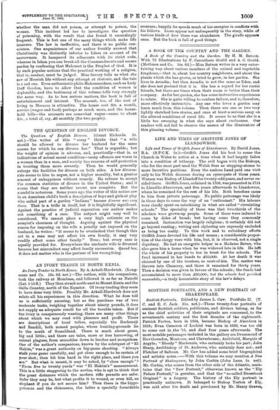THE QUESTION OF ENGLISH DIVORCE.
The Question of English Divorce. (Grant Richards. 2s. net.)—The writer of this " essay " thinks that " a wife should be allowed to divorce her husband for the same causes for which he can divorce her." That is arguable; but the weight of opinion is adverse, and, practically—that is, as indications of actual moral condition—many offences are worse in a woman than in a man, and society has reasons of self-protection in treating them more severely. Then he would generally enlarge the facilities for divorce on both sides. A low divorce- rate seems to him to argue, not a higher morality, but a greater amount of unhappiness without remedy. He refuses to accept the common statistics of divorce in the United States ; and it seems that they are neither recent nor complete. But the vandal is notorious. Some years ago the writer of this notice saw in an American child's book a description of boys and girls at play who called part of a garden "Indiana" because divorce wa3 easy there. That is a trifle in itself, but it is frightfully significant. Against the practice of judicial separation our author makes out something of a case. The subject might very well be considered. We cannot place a very high estimate on the easayist's clearness of thought. Arguing against the physical reason for imposing on the wife a penalty not imposed on the husband, he writes : "It seems to be overlooked that though this act in a man may not affect his own family, it may very readily affect some other family." True ; but every case is equally provided for. Everywhere the unchaste wife is divorced because her misconduct may affect family succession. Quoad hoe, it does not matter who is the partner of her wrongdoing.






















































 Previous page
Previous page